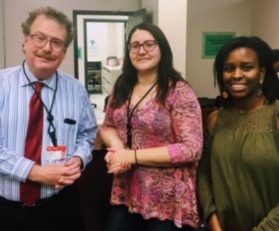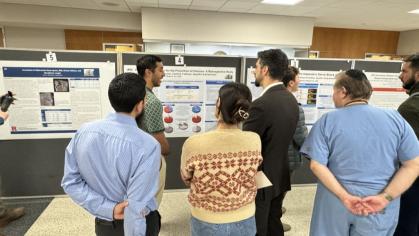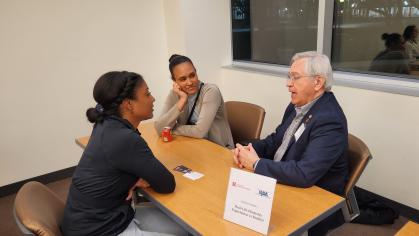Student Uses Dental Calculus to Study Effects of Industrial Age
 From left, Dr. Kenneth Markowitz, Dr.Carla Cugini, and student researcher LaShanda Williams
From left, Dr. Kenneth Markowitz, Dr.Carla Cugini, and student researcher LaShanda Williams
Scientists know that teeth can provide important clues to everything from prehistoric creatures to crime scene information.
One Rutgers student is working with RSDM researchers to explore what teeth can reveal about diet and health during and after the industrial revolution. LaShanda Williams, a Ph.D. student at the Rutgers Center for Evolutionary Studies in New Brunswick, believes that dental calculus might provide information that can’t be found anywhere else.
“The change in the number and type of microbial species can help us tell which people were in good health and which had diseases,’’ said Williams, who received funding from the National Science Foundation for her research.
Her findings could help provide evidence that the evolution of oral healthcare and hygiene, along with chemicals in the environment and dietary habits, had positive or negative impacts on post-industrial Americans.
She is using dental calculus as her sample material because it exists in both skulls and live patients, unlike plaque, which is lost following an individual’s death. Williams’ study involves collecting calculus samples from human skulls stored in museums and comparing them with contemporary samples collected with help from Dr. Kenneth Markowitz of RSDM's Oral Biology Department.
Williams’ RU classmates offered to be subjects, along with RSDM volunteers. Oral biologist Dr. Carla Cugini has been working with Williams as an advisor on the project, developing the protocol used to analyze the samples.
“Working in a molecular evolution lab, LaShanda will take DNA, extract it, sequence it, and use computer algorithms to identify what bacteria are present in the sample,’’ explained Cugini, who met William at a Rutgers symposium, where she expressed an interest in using oral biology as the basis for her research.



